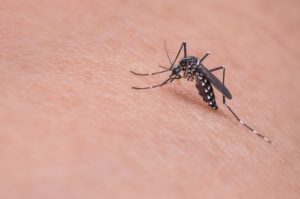Zika Virus: Explained
 Zika virus was reported in Africa and South East Asia as early as 1947 but it has increased in prevalence around the globe. In February of 2016, the World Health Organization declared Zika a Public Health Emergency of International Concern (PHEIC). Dr. Stephanie Harper, Director of the Roanoke City & Alleghany Health Departments of Virginia’s Department of Health wants everyone in Southwest Virginia to understand the realities of Zika virus and what you can do to prevent infection.
Zika virus was reported in Africa and South East Asia as early as 1947 but it has increased in prevalence around the globe. In February of 2016, the World Health Organization declared Zika a Public Health Emergency of International Concern (PHEIC). Dr. Stephanie Harper, Director of the Roanoke City & Alleghany Health Departments of Virginia’s Department of Health wants everyone in Southwest Virginia to understand the realities of Zika virus and what you can do to prevent infection.
In Virginia, we have Asian tiger mosquitos, the mosquitos that can carry Zika virus. This summer many residents will also travel to locations where Zika virus may be spreading.
Whether you are male or female and regardless of whether you remain at home or travel for work, vacation, a mission trip, or to visit with family, it is important to understand how to protect yourself and others.
While symptoms of Zika Virus Disease may be mild, it is the risk of Zika virus exposure to fetuses and newborn babies that causes the greatest concern. Everyone (men and women) can help to prevent the spread of Zika by taking preventative measures in their daily lives. Below are some useful facts and preventive measures you can take to help protect yourself and keep unborn children from suffering severe health complications.
FACTS:
Zika virus usually causes mild disease. Most people infected with Zika virus won’t know they have the disease because 80% won’t experience any noticeable symptoms. If symptoms do develop they are usually mild and can include fever, rash, joint pain or red eyes (conjunctivitis) for up to a week.
Zika virus is primarily spread by the bite of a mosquito. The mosquitoes responsible for spreading Zika Virus Disease are the yellow fever mosquito (Aedes aegypti) and the asian tiger mosquito (Aedes albopictus). They usually bite during the daytime.
It can also be sexually transmitted. Zika virus can also be spread by sexually transmission and from a pregnant woman to her fetus.
Care options are limited. There is currently no vaccine to prevent the virus from causing disease or any medicine to cure it. The symptoms of the disease can be treated with supportive measures like getting rest and preventing dehydration.
Pregnant women can pass Zika virus during pregnancy. We do not know how likely it is that a pregnant woman will pass the virus to her fetus. We do know that Zika virus infection during pregnancy has been linked to severe brain defects.
Microcephaly is a lifelong condition in which a baby’s head fails to develop fully and grows smaller than expected. Microcephaly has been linked to a number of developmental delays and intellectual disabilities, physical disabilities and seizures in children. It is a severe complication of Zika Virus Disease. While microcephaly can be caused by a variety of different factors, in the 2015 Brazilian outbreak, Zika virus was linked to Microcephaly.
PREVENTIVE MEASURES:
- Prevent mosquito bites
– Wear long sleeve shirts and pants
– When possible, stay in places with air conditioning
– Repair damaged screens on doors and windows to prevent mosquitos from entering
– Use EPA registered insect repellants and follow all instructions on the product label
– Apply sunscreen before insect repellent to get active protection from both products
– Avoid standing water:
TIP CONTAINERS – drain standing water from garbage cans, house gutters, downspout extenders, pool covers, cooler, toys, flower pots and any other containers where sprinklers or rain water has collected, outdoor toys, tarps, and containers (for example, buckets, pots, tires, swimming pools, wheel barrows, and trash cans)
TOSS – discard old tires, drums, bottles, cans, pots and pans, broken appliances and any other items that are outside and aren’t being used.
EMPTY AND SCRUB – birdbaths and pets water bowl at least once or twice a week
PROTECT – boats and vehicles from rain with tarps that don’t accumulate water
- Prevent the sexual transmission of Zika virus
- Use condoms correctly every time or don’t have sex
- If you are pregnant, avoid traveling to areas affected by Zika
- If you are pregnant, avoid traveling to areas where Zika virus is spreading
- Prior to your next trip, review a map of areas with active Zika Virus Transmissions (http://www.cdc.gov/zika/geo/active-countries.html) and speak with your healthcare provider
- If your male partner recently traveled to an area with Zika, talk to your healthcare provider
- If you must travel to areas with Zika:
- When you return, avoid mosquito bites for 3 weeks following your trip to avoid spreading Zika to mosquitos that can then bite someone else and spread the disease
- Avoid sexual activity if you experience fever, rash, joint pain or red eyes (Conjunctivitis) and contact your healthcare provider
If you are experiencing symptoms, please visit your local healthcare provider and specifically express your concerns.
For additional public health information visit the Virginia Health Department website at www.vdh.virginia.gov or the national Centers for Disease Control website at www.cdc.gov.




